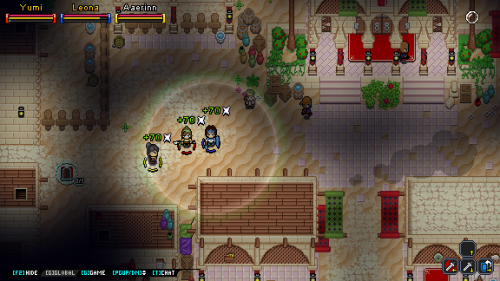[Author's Side Note: I was writing up this super intense, wordy essay about co-operation in games and how our development world was changing, etc etc. Pffft! Who wants to read that?! Not I! The second I realized I wasn't enjoying reading my own writing, I scrapped the whole thing. Thus, the upcoming paragraphs are written more for those of you who are interested in making a video game, but should prove a good read for everyone... Take heed and enjoy!]
Here's the deal: making a video game is hard! Really, really hard! It's especially hard if you're an independent developer like us (one who was trying to make their first game, while going to school or working full time). And much like the fate of the previous version of this article, sometimes you may have to start all over. So, I say to all the budding would-be-solo-developer-geniuses out there who think you've got this dream-game thing all figured out... well... you probably don't.
[Author's Side Note: I realize that someone could come along and mention that ONE GUY who made millions all by himself in order to refute the point I'm driving at... Yeah, don't you dare think I don't know who you're thinking of... Generally, it doesn't happen that way. Look, there's a reason why 99% of video games are made by TEAMS. So keep reading, okay? Oh look... I'm about to reveal the real point of this whole article...]
Beyond all of the complications of video game development, there's one important aspect that is easy to overlook when you're first starting out; the need to ask for help. The moment you admit "Hey, I might need help with this project" is the moment you take your first real step towards turning your dream-game into a reality... game. In this article, I'm not referring to the help you will need in a development team. Granted, you will likely need a team of talented, dedicated, and - let's be honest here - tolerable people to work with in order to finish your first game. Still, even beyond a solid development team lies a legion of important people that will contribute to the success of your end product; these people will play your game to death.
[Author's Side Note: Yes “to death” because they will break the game many times.]

The fans.
The fans won't be shy about telling everyone how they feel, either. Sure, there are some 'fans' who are not going to like your game and feel the need to vilify you for no justifiable reason. Here's a tip: don't listen to those guys. They're just being mean, and mean people are not terribly interested in cooperating, right? Nope! But after you sift through the 'meanies' you will also find fans who are presenting real solutions to (or suggestions for) the issues they have with your game; their input can be invaluable... yet completely FREE!
One particular aspect of game design which fans (or 'testers' if your game isn't having an open beta) can be extremely helpful is in “balancing”. It is very easy for developers to design a game that's challenging for them, while unwittingly crafting a game that is too hardcore for their own future customers. Naturally, the developers know how the game AI works, how to play best at the game, and how to maximize their efforts in every situation. If the game is still challenging for developers, then it will likely feel “impossible” or “broken” to the lay-fan.
If you don't push any testing of your game with people who have never played it before, then you'll be in for a rude awakening when your product finally hits the market. This happened with our game Wanderlust: Rebirth; a game where we wanted to encourage cooperative-play over solo-play. In truth, as a result, we spent the past year and a half balancing the game for solo players alongside our extra-content updates.
